Interview with government Spiritual Adviser of the Dalai Lama
July 16, 2013
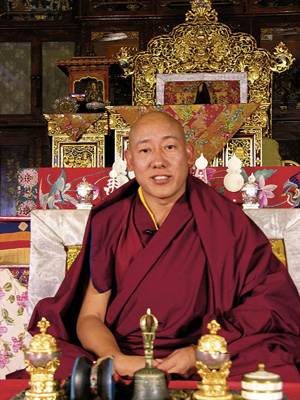 Speaking to the centuries-old, wrathful oracle who advises the Dalai Lama on policy.
Speaking to the centuries-old, wrathful oracle who advises the Dalai Lama on policy.
Over the last two years, a sense of hopelessness has led more than a hundred Tibetans to set themselves on fire to protest Chinese rule. This has put Tibet's spiritual leader, the Dalai Lama, and the government-in-exile in an awkward position: while they don't encourage the self-immolations, they lack alternative methods to affect Chinese policy. At the same time, the process by which the Dalai Lama and other Tibetan leaders consult and take policy positions is shrouded in mystery. The Dalai Lama and other exile leaders, for example, often get advice from oracles: powerful spirits channeled by a human medium, or Кuten.
The chief state oracle is Nechung, Tibet's wrathful protector spirit. According to the Dalai Lama's 1990 autobiography, Freedom in Exile, the Nechung medium has participated in some of the key turning points in Tibetan history. During the 1959 Tibetan uprising, for instance, when it seemed that Chinese forces were on the verge of detaining the then 23-year-old Dalai Lama, the oracle told him, "Go! Go! Tonight!" The medium also wrote down the precise route the Dalai Lama should take to evade Chinese forces on his way to the Indian border.
The current, or 17th, medium for the Nechung spirit is the 55-year-old Thupten Ngodup. Born in Tibet in 1958, Ngodup experienced the early period of Communist Chinese rule and escaped with his family in 1966, the year Chairman Mao Zedong's disastrous Cultural Revolution began. He joined the exiled wing of the Nechung monastery in Dharamsala, India, in 1971.
"Dealing with Nechung is by no means easy," the Dalai Lama wrote in his autobiography. "It takes time and patience during each encounter before he will open up. He is very reserved and austere, just as you would imagine a grand old man of ancient times to be."
Nechung's current medium, a crimson-robed monk with a shaved head and an easy smile, is engaging and relaxed. But he's also politically attuned to the crisis in Tibet: when we met in February, he was preparing space for a billboard outside his residence to commemorate the Tibetans who have self-immolated. We sat together at Ngodup's home, located on the circumambulation route around the Dalai Lama's residence and temple, where servants brought us tea and sweets. The interview, conducted through a translator, has been edited and condensed for clarity.
Foreign Policy: Can you tell me about the first time you were possessed by the Nechung spirit?
Thupten Ngodup: You get this feeling that the oracle is inside you. A sudden feeling. In 1984, the previous medium passed away. For three years, during which I worked as chief of rituals for the monastery, offering incense and tea, we didn't have a Nechung medium. On March 31, 1987, I was spreading incense, and I felt an electric shock through my body: I was in a total trance, and couldn't remember anything.
FP: Did you need specific qualifications?
TN: My predecessors all came from different backgrounds: some were very high officials, some were lamas, and some were lay people. At that point [when I went into a trance], Nechung had made a choice. Two days later, His Holiness [The Dalai Lama] had a special audience for me and asked me what happened. Whatever dreams or signs I had, I told His Holiness. And His Holiness asked me, 'If you become the medium, are you okay with that? Would there be any difficulty for you?' Sometimes when you become the medium, it's difficult for your physical body. You get sickness. I told His Holiness, 'If my becoming the medium helps Tibetans and all sentient beings, then of course I am ready.'
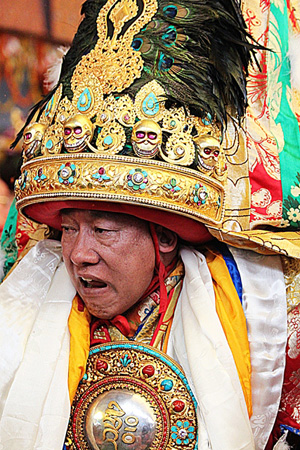 FP: Did they have to conduct certain tests to ensure that the spirit that entered you was not a malevolent imposter?
FP: Did they have to conduct certain tests to ensure that the spirit that entered you was not a malevolent imposter?
TN: His Holiness tested me while I was in trance. It was through rigorous testing that I became the Nechung medium.
FP: The Nechung spirit is described as wrathful. Buddhism is associated with non-violence and compassion, yet here we have this deity who is full of wrath.
TN: All of the oracles are in wrathful form.
FP: Why?
TN: A useful comparison is the family: If the children don't listen to the compassionate mother, the father sometimes has to be fierce so the children will listen. The motive, which is compassionate, is for the children to listen to good advice from their parents. Likewise, we have well-behaved human beings, and not-well-behaved human beings. The oracles are in wrathful form so people will actually listen to them. [Laughs.]
FP: I believe the Oracle was consulted very recently. What were you asked and what were the prophecies?
TN: [Laughs.] His Holiness, members of the government, and high lamas were there. But I don't know what I said, because I was in trance.
FP: How many times are you consulted in a year?
TN: There's no fixed number. Whenever His Holiness needs, he asks me to go into a trance. And the Tibetan government consults with me two times, once in summer and once in winter.
FP: How many times did His Holiness request you last year?
TN: Around seven or eight times.
FP: And you never know what you're asked and what answers you give?
TN: Many people ask that question. I tell them it's like last night, you had a dream or many different dreams, and in the morning you can't remember them clearly. It's that kind of feeling. The first time I saw myself on video, I thought: That's not me.
FP: So you wouldn't know, for instance, if you had been consulted about the wave of self-immolations inside Tibet?
TN: I don't know. But let me make this clear: They don't simply rely on the prophecies of the Nechung Oracle. We follow a democratic process in exile. Everything is discussed in the parliament and the cabinet, and if they are not clear, or want to hear the opinions or prophecies of the Oracle, they will consult. Ultimately, the decision depends on them, not the Oracle.
FP: Have you been asked recently about the Middle Way, the policy favoring "meaningful autonomy" for Tibet, versus a policy seeking independence [which young activists increasingly favor]?
TN: Even last year, they asked this question. When I'm in a trance, I don't know what I'm asked, but later I have seen it written in government files that the Oracle made a clear statement that there is no better policy than the Middle Way -- at the moment.
FP: What are your thoughts on the self-immolations, which number over 100 now?
TN: They are self-immolating because they want to draw international attention to what is really happening inside Tibet: that there are no human rights, no freedom of religion... I feel that this form of sacrifice that Tibetans are doing is a form of nonviolence. You have the right over your own body, and they are sacrificing their bodies for the sake of others. If you look at where they are self-immolating, they are not doing it in a [crowded public space] where they could hurt others. They are doing it in a place where they hurt themselves and nobody else.
Interview by Jeffrey Bartholet
is a former editor and foreign correspondent for Newsweek magazine.
His trip to Dharamsala, India, was supported by a grant from the Pulitzer Center for Crisis Reporting.
Tenzin Lekshay
Media Coordinator
By media-links:
www.foreignpolicy.com
![]()
![]()
![]()
![]()
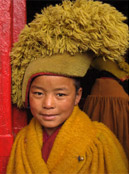
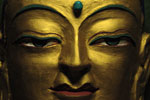
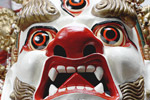
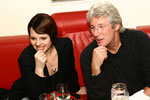
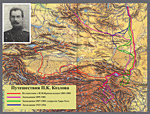
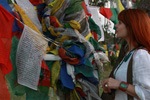
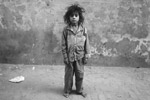
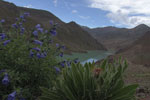
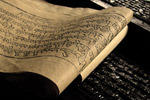
 Speaking to the centuries-old, wrathful oracle who advises the Dalai Lama on policy.
Speaking to the centuries-old, wrathful oracle who advises the Dalai Lama on policy. FP: Did they have to conduct certain tests to ensure that the spirit that entered you was not a malevolent imposter?
FP: Did they have to conduct certain tests to ensure that the spirit that entered you was not a malevolent imposter?